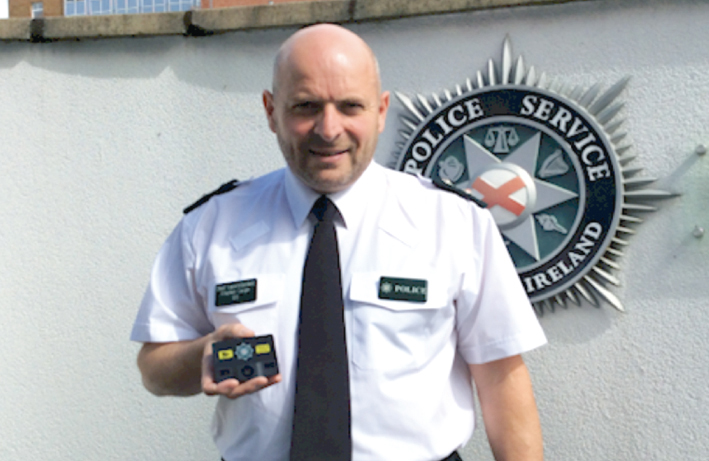PSNI begins rollout of body-worn video
The Police Service of Northern Ireland (PSNI) is beginning the rollout of body-worn video (BWV) cameras to frontline officers following a pilot scheme run in four policing districts during 2014.
The Police Service of Northern Ireland (PSNI) is beginning the rollout of body-worn video (BWV) cameras to frontline officers following a pilot scheme run in four policing districts during 2014.
Officers from Derry City and Strabane will be the first to have access to the technology, followed by Belfast later in the year.
Chief Superintendent Stephen Cargin from the Legacy and Justice Department said the officers had received training for the camera and the supporting technology to ensure that the integrity of the footage is protected, while making it as easy as possible to access and utilise this material when preparing files.
Video evidence goes hand in hand with accountability and transparency, both of which are key elements in increasing public confidence in policing. The PSNI is fully committed to these principles as we continue to work together with the community within the context of keeping people safe, he added.
Chief Supt Cargin said the PSNIs internal information and communications services were playing an integral part in the delivery of BWV.
They have invested a great deal of effort and energy into processes to make the system user-friendly, he added.
Justice Minister Claire Sugden welcomed the rollout of BWV technology and said: Video evidence can provide a compelling account of the activities of victims and suspects and enables the raw emotion and action from a scene to be replayed in the courts in a manner that could never be captured in a witness statement.
This will bring a range of benefits for both the criminal justice system and victims of crime, through improving the quality of evidence and outcomes as well as potentially speeding up justice.
The 2014 pilot evidenced the benefits of BWV and a business case was submitted to the Department of Justice and funding secured to purchase BWV technology.
The PSNI appointed Edesix as the supplier for BWV technology earlier this year.
PSNI Assistant Chief Constable Mark Hamilton said they were always striving to identify new processes to support the delivery of effective frontline policing. This includes the use of new and emerging technological solutions.
In 2014, we piloted the use of BWV in G District, which was one of our eight policing districts, at that time. We were keen to establish what benefits this technology would bring in terms of supporting accountability, improving outcomes for victims of crime and streamlining criminal justice processes to produce speedier justice, said Mr Hamilton.
We also needed to understand the level of technological infrastructure that was required and what changes or upgrades we might have to implement to facilitate the movement of this video footage from one station or location to another.
He added: The pilot evidenced how BWV has the potential to improve the quality of evidence provided by police officers and thereby increase the proportion of offences brought to justice.
Richie McBride, managing director of Edesix, said the benefits of BWV technology in policing have been widely recognised.
As Mr Hamilton mentioned, BWV can be used to support the delivery of a transparent, accountable police service, from the perspective of both police officers and of the communities they serve, he added. As a result, the technology is being actively used by a number of police services across the world.
Mr McBride said Edesix would be working closely with the PSNI in the coming months to support the introduction of BWV technology across frontline policing.
Given the size and scale of this project, and the training that will have to be undertaken by officers prior to using the equipment, the rollout will be phased over a number of months, he added.




